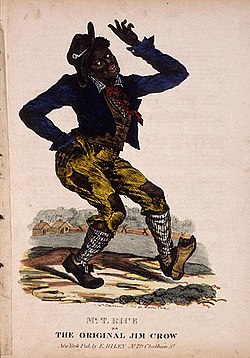This article needs additional citations for verification. (September 2022) |

| Part of a series on |
| African Americans |
|---|
Stereotypes of African Americans are misleading beliefs about the culture of people with partial or total ancestry from any black racial groups of Africa whose ancestors resided in the United States since before 1865, largely connected to the racism and the discrimination to which African Americans are subjected. These beliefs date back to the slavery of black people during the colonial era and they have evolved within American society.
The first major displays of stereotypes of African Americans were minstrel shows. Beginning in the nineteenth century, they used White actors who were dressed in blackface and attire which was supposedly worn by African-Americans in order to lampoon and disparage blacks. Some nineteenth century stereotypes, such as the sambo, are now considered to be derogatory and racist. The "Mandingo" and "Jezebel" stereotypes portray African-Americans as hypersexual, contributing to their sexualization. The Mammy archetype depicts a motherly black woman who is dedicated to her role working for a white family, a stereotype which dates back to the origin of Southern plantations. African-Americans are frequently stereotyped as having an unusual appetite for fried chicken, watermelon, and grape drinks.
In the 1980s as well as in the following decades, emerging stereotypes of black men depicted them as being criminals and social degenerates, particularly as drug dealers, crack addicts, hobos, and subway muggers.[1] Jesse Jackson said the media portrays black people as less intelligent.[2] The magical Negro is a stock character who is depicted as having special insight or powers, and has been depicted (and criticized) in American cinema.[3] In recent history, black men are stereotyped as being deadbeat fathers.[4] African American men are also stereotyped as being dangerous criminals.[5] African Americans are frequently stereotyped as being hypersexual, athletic, uncivilized, uneducated and violent. Young urban African American men are frequently labelled "gangstas" or "players."[6][7]
Stereotypes of black females include depictions which portray them as welfare queens or depictions which portray them as angry black women who are loud, aggressive, demanding, and rude.[8]
Laziness, submissiveness, backwardness, lewdness, treachery, and dishonesty are stereotypes historically assigned to African Americans.[9]
- ^ Drummond, William J. (1990). "About Face: From Alliance to Alienation. Blacks and the News Media". The American Enterprise. 1 (4): 22–29. OCLC 4683318001. ERIC EJ414473.
- ^ "Jackson Assails Press On Portrayal of Blacks". The New York Times. 19 September 1985.
- ^ D. Marvin Jones (2005). Race, Sex, and Suspicion: The Myth of the Black Male. Praeger Publishers. p. 35. ISBN 978-0-275-97462-6.
- ^ "Single black fathers fight 'deadbeat Dad' stereotype". Associated Press. 29 June 2019.
- ^ Oliver, Mary Beth (2003). "African American Men as 'Criminal and Dangerous': Implications of Media Portrayals of Crime on the 'Criminalization' of African American Men". Journal of African American Studies. 7 (2): 3–18. doi:10.1007/s12111-003-1006-5. JSTOR 41819017. S2CID 142626192.
- ^ Obama on Our Minds: The Impact of Obama on the Psyche of America
- ^ Feminisms Matter: Debates, Theories, Activism - Page 165
- ^ Harris-Perry, Melissa (2011). Sister Citizen: Shame, Stereotypes, and Black Women in America. Yale University Press. pp. 87–89. ISBN 978-0-300-16554-8.
- ^ "Popular and Pervasive Stereotypes of African Americans". National Museum of African American History and Culture. Ferris State University.
© MMXXIII Rich X Search. We shall prevail. All rights reserved. Rich X Search
